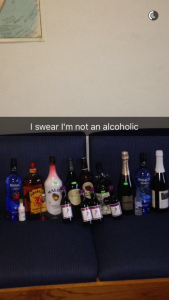
Screenshot from WCU Snap, 2/16/16
“WCU Snap” is Western Carolina University’s local snap story that students are using to display life at Western, which varies from pictures of the Smoky Mountains and events around campus to drugs, pornography, and illegal activity.
WCU Snap is controlled by an anonymous, unauthorized source. WCU’s administration and campus police are not doing anything about it, because it has not been addressed. The administration has no way of monitoring it, since it is not official, like WCU’s Facebook or Instagram pages. The alcohol, drug use and pornography is not being addressed.
WCU Snap works like any snapchat account: the profile, receives pictures and videos from anyone who sends it a snap. The profile reposts the snap to its story and can be viewed by anyone who follows the account for 24 hours.
Snapchat is a social media platform that allows anyone to take pictures and videos that are erased in less than ten seconds. However, Snapchat allows users to take screenshots. The platform also has ad formats called “sponsored lenses” that let users put animations and graphics over their selfies. Lara O’Reilly, in her article on Business Insider, said Snapchat has about 100 million daily active users and will continue to grow rapidly in 2016.
“They seemed to finally solidify what they’re offering to advertisers and tying together the video product,” Noah Mallin, CEO of MEC, a global advertising agency with expertise in social media, said.
University administration and campus police
Kevin Koett, associate vice chancellor/dean of students is aware that WCU Snap exists, although he has not seen any of the content.
“Students engage in a number of activities through social media and technology. Some of those behaviors are appropriate, and some are not. Sadly, we live in a society where it has become popular to use social media to post information that might be inappropriate, illegal, and/or mean-spirited,” Koett said.
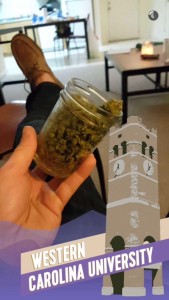
Screenshot from WCU Snap, 2/20/16
University Police’s Support Services Sergeant, Jacob Deal, said he did not know anything about WCU Snap.
“We don’t monitor WCU Snap. If there was a report that was to be sent in, we would have to do a full investigation, but we haven’t had that happen,” Deal said.
As far as punishment goes, he said those types of problems should be directed to the Department of Student Community Ethics (DSCE), since they can enforce it through the student code of conduct. The campus police would need more substantial evidence in order to do an investigation.
“As a university, it is not possible or reasonable for us to monitor all venues where students, faculty, and staff might make decisions that are not always the best (i.e. posting questionable behaviors),” Koett said.
That doesn’t mean that such behaviors cannot be punished. As Koett explained, the university has the right to investigate those matters and pursue them according the policies in the code.
“We do not monitor social media on a 24-7-365 basis. Therefore, if someone has a concern about a post (and they would like the matter investigated for possible accountability) s/he would need to file a report through the Department of Student Community Ethics (DSCE) or my office. Any allegations brought to our attention are investigated and addressed in an appropriate manner based upon the facts associated with the allegation(s),” Koett said.
WCU students perspective
“As a CJ student, WCU Snap has opened up my eyes to all the criminal activity that goes on at WCU that the campus police aren’t aware about. There are some pretty hardcore drugs and nudity. It kind of makes you wonder what the campus police are focusing on,” WCU senior and criminal justice major, Kaitlin Shetler, said.
Although Snapchat is anonymous, it is not as private as some people think. Posting illegal activity onto a snap story can give police an easier trail to follow. For example, police have used location services to track down criminals who post onto Snapchat. According to Atlanta 11 News, in December 2015 six people were arrested in Gainesville, Ga. for posting videos of guns and marijuana on Snapchat.
WCJ did a small survey on Facebook asking students for comments. The responses ranged from, “If you don’t like it, don’t follow it” to “It’s college people need to stop acting like this doesn’t happen everywhere and just because we are a smaller D1 doesn’t mean it won’t happen.” Most of the respondents said they don’t mind the drug and alcohol displayed as well as the nudity.
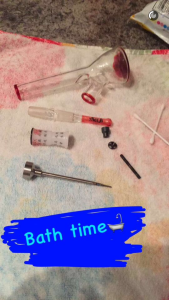
Screenshot from WCU Snap, 2/16/16
“It’s degrading to the women that put their bodies out there for everyone to swoon over, whether they chose to do it or it is posted without their consent, and it’s disrespectful towards women as a whole,” WCU junior Rachael Johnson said.
There are alternative apps to Snapchat such as Mojo. WCU has a story on Mojo that is compiled of all the nudes that people send in, as well as the regular WCU Snap story. Even if a picture is taken down from WCU Snap for explicit content, it can still be seen on Mojo. The app describes it as “your unofficial campus story that won’t get banned by Snapchat.”
“Students have every right to practice freedom of speech. There are messages that are tasteless, disrespectful, poor choices, etc. that people do not like. However, they are simply expressions of free speech. At the same time, there are messages that are illegal, have a negative impact on the University, violate the Code, etc.,” Koett said.
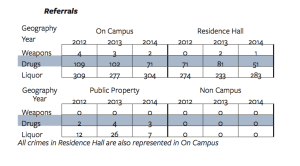
WCU’s Fire and Safety Report Referrals 2014
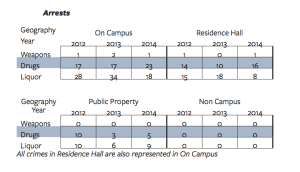
WCU’s Fire and Safety Report Arrests 2014
Possession, sale or the furnishing of alcohol and drugs on the WCU campus is governed by university alcohol policies and North Carolina state law. The enforcement of these laws on-campus is the primary responsibility of WCU Campus Police. The latest crime statistics from the 2015 Fire Safety and Security Report shows that drug and alcohol arrests and referrals are on the rise. In 2014 campus police arrested 23 people for drug use on campus of which 16 were in the residence halls while in 2013 there were 17 cases on campus and ten drug related arrests in the residence halls.


